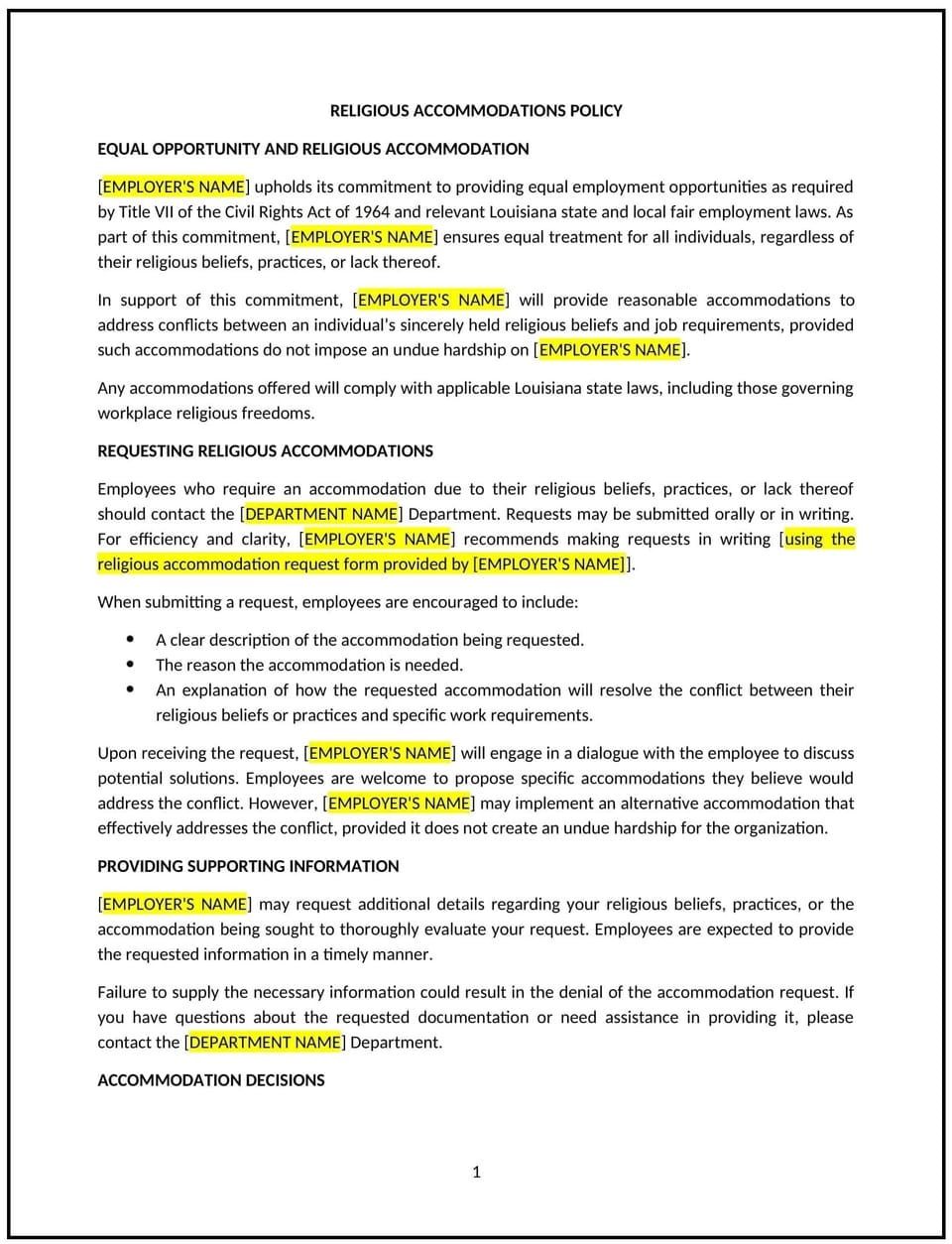Religious accommodations policy (Louisiana): Free template

Religious accommodations policy (Louisiana)
This religious accommodations policy is designed to help Louisiana businesses establish guidelines for supporting employees’ religious practices and beliefs. It outlines procedures for requesting accommodations and ensuring that such accommodations are handled fairly and respectfully.
By implementing this policy, businesses can foster inclusivity, support employee well-being, and create a respectful work environment.
How to use this religious accommodations policy (Louisiana)
- Define scope: Specify the types of religious accommodations the policy covers, such as flexible scheduling, prayer breaks, or exemptions from certain duties.
- Outline request procedures: Provide clear steps for employees to request accommodations, including required documentation or forms.
- Address evaluation processes: Detail how requests will be assessed based on reasonableness, feasibility, and potential business impact.
- Include examples of accommodations: Offer examples like adjusting work hours for religious observances or allowing religious attire.
- Communicate responsibilities: Clarify the roles of employees and managers in implementing and supporting accommodations.
- Provide review mechanisms: Establish a process for reviewing and, if necessary, appealing decisions related to accommodation requests.
Benefits of using a religious accommodations policy (Louisiana)
Implementing this policy provides several advantages for Louisiana businesses:
- Promotes inclusivity: Fosters a workplace culture that respects diverse religious beliefs and practices.
- Supports employee well-being: Ensures employees feel valued and respected in their personal and professional lives.
- Reduces conflicts: Establishes clear procedures for handling accommodation requests fairly and consistently.
- Enhances morale: Demonstrates the business’s commitment to supporting employees’ individual needs.
- Reflects Louisiana-specific practices: Adapts to local cultural dynamics and workplace norms.
Tips for using this religious accommodations policy (Louisiana)
- Train managers: Provide training to ensure managers handle accommodation requests respectfully and in alignment with the policy.
- Document requests: Maintain records of all accommodation requests, decisions, and communications for transparency.
- Encourage open communication: Create an environment where employees feel comfortable discussing their needs without fear of bias.
- Be flexible: Evaluate each request on a case-by-case basis, considering reasonable adjustments that balance employee needs with business operations.
- Update regularly: Revise the policy to address changes in workplace practices or Louisiana-specific considerations.
Q: What types of accommodations are covered under this policy?
A: Accommodations may include flexible scheduling, prayer breaks, religious attire, or exemption from certain duties conflicting with religious beliefs.
Q: How can employees request religious accommodations?
A: Employees should submit a formal request to HR or their manager, outlining the accommodation needed and the reason for the request.
Q: What factors are considered when evaluating accommodation requests?
A: Factors include the reasonableness of the request, its feasibility, and its potential impact on business operations or other employees.
Q: Are employees required to provide documentation for accommodation requests?
A: In some cases, employees may need to provide documentation, such as a letter from a religious leader, to support their request.
Q: What happens if an accommodation request is denied?
A: Employees may appeal the decision by following the review process outlined in the policy.
Q: How often should this policy be reviewed?
A: The policy should be reviewed annually or when workplace practices or Louisiana-specific needs evolve.
Q: How can businesses foster inclusivity regarding religious accommodations?
A: Businesses can provide training, encourage open communication, and evaluate requests fairly to create a respectful and supportive workplace.
This article contains general legal information and does not contain legal advice. Cobrief is not a law firm or a substitute for an attorney or law firm. The law is complex and changes often. For legal advice, please ask a lawyer.


